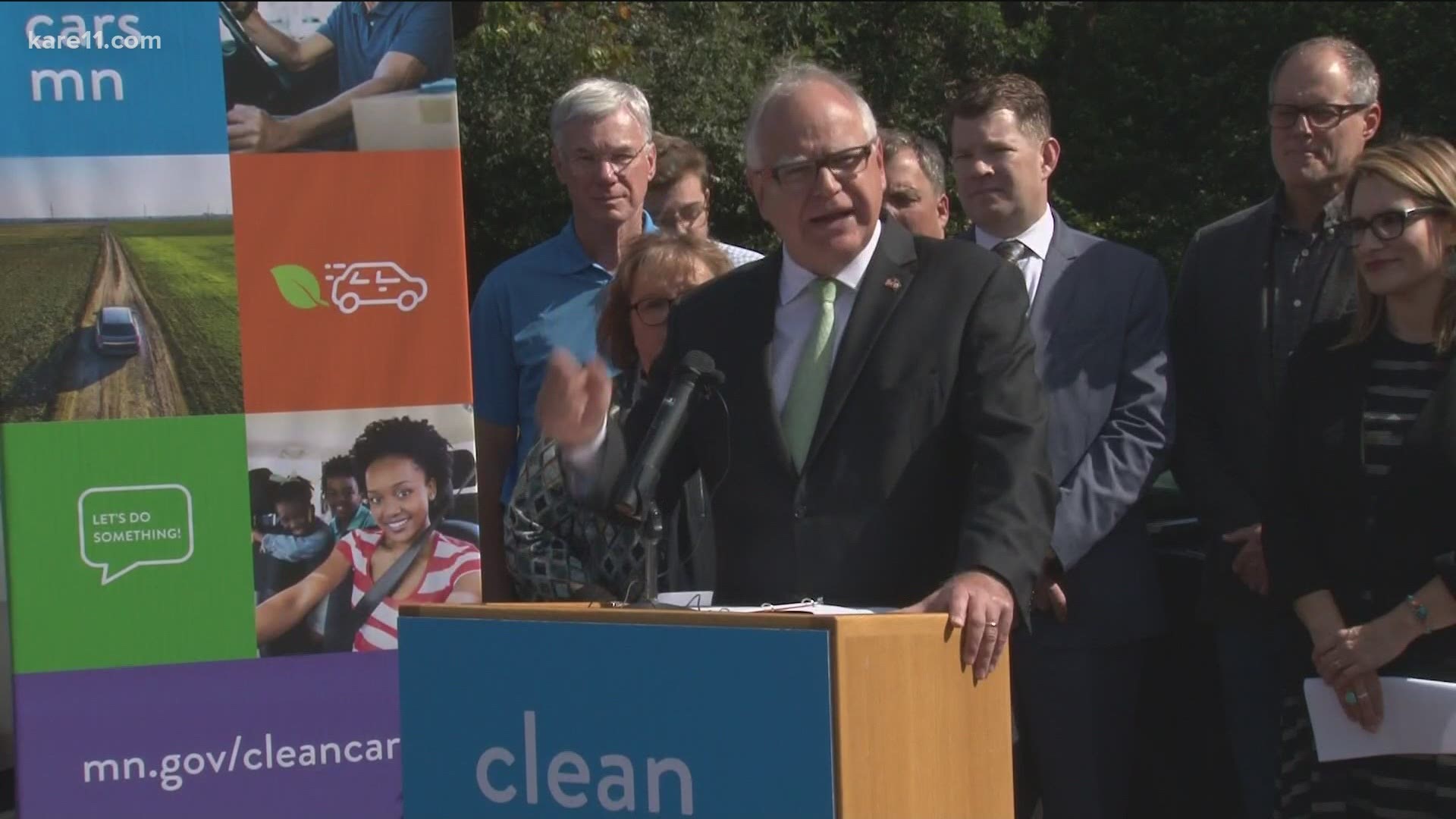ST PAUL, Minn. — Republican state lawmakers say they're serious about cutting off funding to the DNR later this summer, and in the process closing state parks, if Gov. Tim Walz doesn't postpone his Clean Cars emissions standards.
It's one of the unresolved issues hanging over State Capitol headed into a June special session, where legislators must pass a two-year, balanced state budget in order to avoid a state shutdown.
At this point there's no sign Gov. Walz will further delay the standards, which have been approved by an administrative judge and are set to go into effect beginning with the 2025 model year.
"Why would we not take a lead? Why would we not get ahead on this?" Walz told KARE.
"The idea we would close our parks for trying to lead where other states are going to go? By the time we're done there will be another dozen states on board."
Walz rolled out his Clean Cars Minnesota plan in 2019 as way to force automakers to sell more electric vehicles, which they'd have to do in order to meet higher fuel economy standards. In general, better fuel economy leads to lower average levels of harmful tailpipe emissions.
Thus far, 15 states are using the California-style standards that are tougher than federal standards.
"The 15 states that have clean air standards, they get incentivized to have these vehicles. So, while we have six or eight choices, other states have 40 choices."
The Minnesota Pollution Control Agency is empowered by state law to set emissions standards. The agency created the Clean Cars rule through the administrative rule-making process, which involved public hearings and collecting public comments for an extended period of time.
And administrative law judge signed off the rule May 7, reaffirming the agency had created the rule legally and demonstrated that it would have the effect of lowering carbon pollution in Minnesota.
Senate Republicans have complained often throughout the process that something as significant as setting vehicle emissions standards should have to be approved by lawmakers. That would've given the Senate the opportunity to block the new rules.
The state's auto dealers have opposed the rules because they'll be required to make room on their car lots for electric vehicles -- cars they believe will end up being too expensive to sell here. Cars left on the lot at the end of a model year often must be sold at a discount.
The Minnesota Auto Dealers Association has pointed out that Chevrolet Silverado pickups are the top selling vehicles in this state, as opposed to California where Honda Civics are the top sellers. They've asked the governor to hold off on signing the new rule until President Biden makes his intentions clear on national Corporate Average Fuel Economy, or CAFE, standards.
"When I'll ask people what really bothers you about this? They say, 'I want to buy a gas car.' Well go ahead! They'll say, 'The price of cars is going to go up.' No, that hasn't proven true in any of the other 15 states."
Walz said the polarized politics of 2020 led to a lot of misinformation being spread in social media and along the campaign trail, when it comes to what the California standards would do in Minnesota.
He pointed out, contrary to rumors, off-road farm equipment and construction vehicles won't be included in the standards. Walz also reiterated that no one will be forced to buy an electric vehicle or high-mileage gas-powered car. It's all about bringing down statewide average emissions.
Senate Republicans have now said they won't pass a final version of the Environment and Natural Resources budget bill unless Walz postpones the standards until the 2027 model year. That would lead to a partial shutdown of the MPCA and the DNR, which runs the state parks system and regulates fish and game in the state.
"We know the electric vehicles are coming to this state," Republican Senate Majority Leader Paul Gazelka told reporters this week. "We're just against the emissions standards."
The Walz Administration has only six months to adopt the Clean Cars Minnesota rule now that the judge has approved it. A two-year delay would mean starting the entire rule-making process over again.
The next step is for the Governor to sign the rule. After he does that the MPCA submits it to the Secretary of State, which triggers a 14-day window for the governor to veto it.
The issue remained unresolved when Gazelka, House Speaker Melissa Hortman and Walz announced they had reached an agreement on overall spending and tax break targets for the next two-year budget cycle. Gazelka expressed hope the lawmakers on the Environment and Natural Resources working group could reach an agreement.
But lawmakers lack control over emissions standards, so it's remains a standoff between Walz and Senate Republicans.

